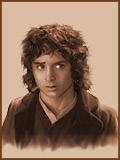

J.R.R Tolkien’s The Lord of the Rings and J.K. Rowling’s Harry Potter series discuss the topic of good and evil. Tolkien unlike Rowlings portrayed good and evil as black and white, an action as being either intrinsically evil or intrinsically good. Evil actions in his tales have evil results. Saruman the wizard starts out good but his continual choice of evil corrupts him and all under his power. He is not able to achieve a good end by a bad means. In J.K. Rowlings novels the topics of good and evil are blurred. Although Harry and his friends are the good guys in the series they often do bad things to get what they want.
In the first book of J.R Tolkien’s trilogy two of the main characters are faced with a challenge. Aragorn, the heir of Ilsildor, and Boromir, son of Denethor, could easily have taken the ring from Frodo the bearer but neither do. Aragorn, from the beginning of the tale, chooses not to use the ring for himself but to safeguard it and Frodo. Boromir was tempted by the ring and at one point tried to wrest it from the ring bearer. Although he only wished to use it to help his people the power of the ring caused him to be filled with lust. The ring also tempted Boromir’s father, the steward of Gondor. He used a tool of the Dark Lord in an attempt to safe guard his realm but was corrupted by the dark forces of Sauron and as a result killed himself. The great wizard Saruman fell in the same way. He used an instrument of the enemy to try to gain power for himself and came under the spell of the Dark Lord. (Tolkien, J.R.R. The Lord of the Rings. 50th Anniversary Edition. New York: Houghton Mifflin Company, 2004. Print.) An evil means cannot be used to achieve a good end.
You reap what you sow. Author J.K. Rowling however doesn’t seem to think so. Her characters often do bad things with no negative consequences. They perform unjust acts in the name of justice. No matter what the circumstances good results don’t justify a bad way of getting them. Stealing ice cream for a sibling’s party does not justify the act of stealing even if that is the only way of getting the ice cream. In Harry Potter and the Order of Phoenix both Harry and his friend Ron pass exams by cheating. Harry even cheats to win the Triwizard. Harry’s godfather, Sirius, encourages deterrent behavior and Harry and his friends break school rules often but are never punished.
J.K. Rowling’s series presents readers with an ideology known as moral relativity. Moral relativists believe that there are no moral absolutes, that good and evil are relative, and that the morality of an action changes with the circumstance and intentions of the person. It is true that if an individual is unaware that he is doing something wrong he himself is not guilty of the misdemeanor but the action itself remains immoral. Cheating is always wrong even if we do it for the good of another. An example is Hermoine doing Harry and Ron’s homework for them. Just because Harry and his friends stand for what is good doesn’t excuse deterrent behavior. Harry is never punished for his misconduct but is often encouraged to do it. In contrast Tolkien’s characters suffer the consequences of their wrong actions. For example to save the life of Faramir, the son of Gondor’s Steward, Bergond, one of the guards, leaves his post to save him. In Gondor this was punishable by death. Since he had left his post to save someone’s life he was spared this harsh sentence but was still forced to leave the city. Saruman the wizard and his cohort Grima Wormtongue are locked in the tower of Insengard for their traitorous deeds. Actions have consequences. No matter what the results of the action a good end never justifies a bad means. The protagonist Frodo is saved from the power of the ring by the creature Gollum. Although he saved Frodo’s life Gollum is punished by fate since in saving Frodo he took the forbidden ring for himself. Gollum’s lust destroys him and he dies in the fires of Mount Doom as a punishment. (Tolkien, J.R.R. The Lord of the Rings. 50th Anniversary Edition. New York: Houghton Mifflin Company, 2004. Print.)Tolkien’s tales teach us that no matter how noble the intention our evil actions will be punished someday.








I am a harry potter and J.R.R Tolkien fan.
ReplyDeleteI actually dont neccesarily have a problem with the Harry Potter books. I think the movie show much more that my imagination got from the book.
Hm...good points, true. I am a HUGE HP fan - more so than Tolkien. WAY more so. But you have good points.
ReplyDeleteBravo! I agree 100% percent, Ardoniel!
ReplyDelete